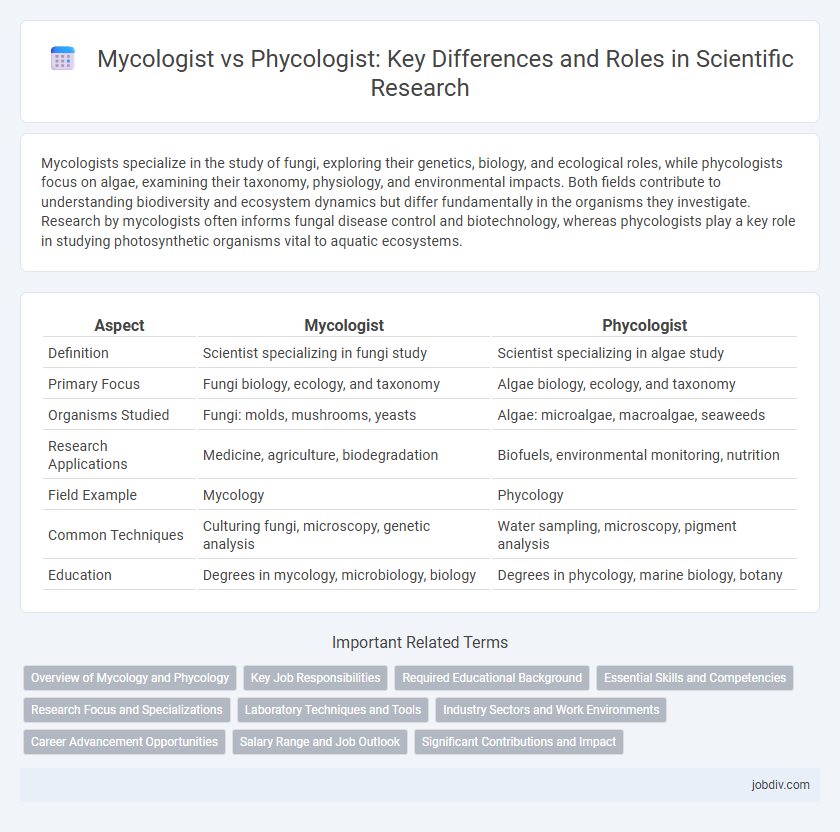Mycologists specialize in the study of fungi, exploring their genetics, biology, and ecological roles, while phycologists focus on algae, examining their taxonomy, physiology, and environmental impacts. Both fields contribute to understanding biodiversity and ecosystem dynamics but differ fundamentally in the organisms they investigate. Research by mycologists often informs fungal disease control and biotechnology, whereas phycologists play a key role in studying photosynthetic organisms vital to aquatic ecosystems.
Table of Comparison
| Aspect | Mycologist | Phycologist |
|---|---|---|
| Definition | Scientist specializing in fungi study | Scientist specializing in algae study |
| Primary Focus | Fungi biology, ecology, and taxonomy | Algae biology, ecology, and taxonomy |
| Organisms Studied | Fungi: molds, mushrooms, yeasts | Algae: microalgae, macroalgae, seaweeds |
| Research Applications | Medicine, agriculture, biodegradation | Biofuels, environmental monitoring, nutrition |
| Field Example | Mycology | Phycology |
| Common Techniques | Culturing fungi, microscopy, genetic analysis | Water sampling, microscopy, pigment analysis |
| Education | Degrees in mycology, microbiology, biology | Degrees in phycology, marine biology, botany |
Overview of Mycology and Phycology
Mycology is the scientific study of fungi, encompassing their genetic analysis, biochemical properties, and ecological roles such as decomposition and symbiosis. Phycology, or algology, focuses on the biology of algae, addressing their photosynthetic processes, taxonomy, and significance in aquatic ecosystems as primary producers. Both disciplines employ microscopy and molecular techniques to classify organisms and understand their environmental impacts and applications in biotechnology.
Key Job Responsibilities
Mycologists specialize in the study of fungi, focusing on their genetics, biochemical properties, and ecological roles, often investigating fungal diseases and their applications in medicine and agriculture. Phycologists concentrate on algae, analyzing their taxonomy, physiology, and environmental impact, playing a crucial role in understanding aquatic ecosystems and biofuel development. Both scientists employ microscopy and molecular techniques, but their key responsibilities diverge based on their specific organismal focus and research objectives.
Required Educational Background
Mycologists typically require a bachelor's degree in biology, microbiology, or a closely related field, often followed by a master's or PhD specializing in mycology to conduct advanced research on fungi. Phycologists normally pursue a similar educational path, starting with a bachelor's degree in biology, botany, or marine science, then advancing to graduate studies focused on the biology and ecology of algae. Both disciplines emphasize extensive training in laboratory techniques, taxonomy, and ecological principles, essential for professional expertise in fungal or algal sciences.
Essential Skills and Competencies
Mycologists excel in fungal taxonomy, ecology, and laboratory techniques essential for identifying and studying fungal species, while phycologists specialize in algal biology, photosynthesis processes, and aquatic ecosystem analysis. Both disciplines demand strong analytical skills, proficiency in microscopy, and expertise in molecular biology methods such as DNA sequencing. Mastery of environmental sampling, data interpretation, and research design is critical to advancing knowledge within fungal and algal sciences.
Research Focus and Specializations
Mycologists specialize in studying fungi, exploring areas such as fungal genetics, physiology, and ecology, with applications in medicine, agriculture, and biotechnology. Phycologists focus on algae, investigating their taxonomy, photosynthesis, and ecological roles in aquatic environments, contributing to biofuel development and environmental monitoring. Both fields advance understanding of distinct organisms vital to ecosystems, yet their research scopes diverge significantly in biological classification and applied sciences.
Laboratory Techniques and Tools
Mycologists employ advanced microscopy, DNA sequencing, and culture media to identify fungal species and study their physiological properties, emphasizing sterilization techniques to prevent contamination. Phycologists utilize spectrophotometry, chromatography, and fluorescence microscopy to analyze algal pigments and biochemical composition, often applying specialized sampling tools for aquatic environments. Both disciplines rely heavily on molecular assays and bioinformatics tools to enhance the accuracy and efficiency of species identification and phylogenetic analysis.
Industry Sectors and Work Environments
Mycologists specialize in fungi research applied extensively in pharmaceuticals, agriculture, and food industries, focusing on antibiotic development, crop protection, and fermentation processes. Phycologists study algae with significant roles in biofuel production, wastewater treatment, and nutraceutical industries, utilizing algae's capacity for carbon sequestration and biomass generation. Both professions operate in laboratories, research institutions, and field environments, but Mycologists tend to engage more with soil and plant ecosystems while Phycologists work primarily in aquatic habitats and marine settings.
Career Advancement Opportunities
Mycologists specializing in fungi research often find career advancement opportunities in pharmaceuticals, agriculture, and environmental science sectors due to the increasing demand for fungal biotechnologies. Phycologists, experts in algae, benefit from expanding roles in biofuel production, environmental monitoring, and marine ecology, driven by renewable energy initiatives and climate change studies. Both fields offer prospects in academia and industry, with interdisciplinary collaboration enhancing career growth in biotechnology and ecological conservation.
Salary Range and Job Outlook
Mycologists, who specialize in fungi, typically earn an average salary ranging from $50,000 to $90,000 annually, with job growth projected at around 5% through 2030 due to increasing interest in fungi-based products and environmental research. Phycologists, experts in algae, generally have a salary range of $55,000 to $95,000, benefiting from rising demand in biofuel development and aquatic ecosystem management, with a job outlook growth rate close to 6%. Both fields offer specialized career opportunities, but the expanding biotechnology sector slightly favors phycologists in terms of salary and job market expansion.
Significant Contributions and Impact
Mycologists have significantly advanced the understanding of fungal biology, ecology, and medicine, with breakthroughs in antibiotic development and fungal disease management that have transformed healthcare and agriculture. Phycologists have contributed fundamentally to marine ecology and climate science by studying algae's role in carbon fixation and as a basis of aquatic food webs, influencing biodiversity conservation and biofuel research. Both fields impact environmental sustainability and biotechnology, with mycologists focusing on terrestrial ecosystems and pharma applications, while phycologists emphasize aquatic systems and renewable resource potential.
Mycologist vs Phycologist Infographic

 jobdiv.com
jobdiv.com